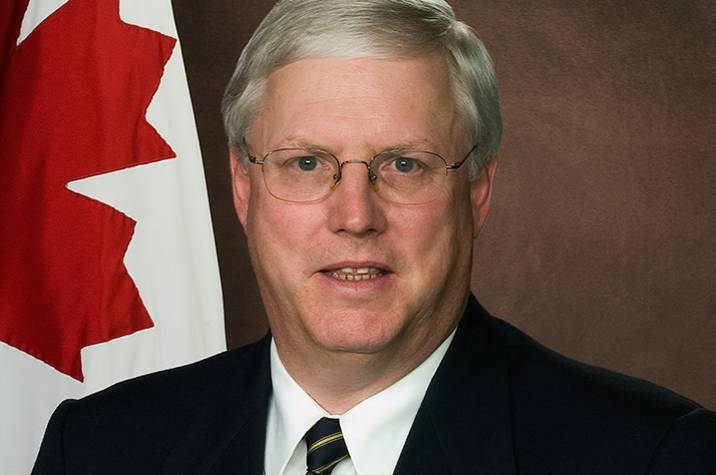Retired RCMP Commissioner William Elliott talks about his unexpected path to becoming leader (Q-and-A)
By Meagan Massad

William John Shannon Elliott served as the 22nd Commissioner of the RCMP from July 2007 to November 2011, and was hired from outside the organization as a senior public servant and led as the first civilian member.
Image by RCMP
January 2, 2025
Content
William John Shannon Elliott served as the 22nd Commissioner of the RCMP from July 2007 to November 2011 and was the first civilian to be appointed to lead the organization. As part of our series of interviews with former commissioners, Gazette writer Meagan Massad sat down with Elliott to discuss his path to becoming Commissioner, and the obstacles he faced in the role.
- Where did you work before joining the RCMP?
-
I became Deputy Commissioner of the Canadian Coast Guard in 1998. It's a job that had similarities to the RCMP – has front line uniformed staff serving in many communities in Canada, including smaller communities. It taught me a lot about the organization.
In 2000, I became an assistant deputy minister at Transport Canada in the area of safety and security. Before the 9/11 terrorist attacks on the World Trade Centre in New York, my role at Transport Canada was 10 per cent security, but after Sept. 11, it became 100 per cent of the job. We helped the RCMP set up the Air Carrier Protective Program. From there, I went on to work for the National Security Advisor to the Prime Minister, and ultimately took over that role myself. In 2006, I was appointed as Associate Deputy Minister of Public Safety.
- What led you to apply for the job of RCMP Commissioner?
-
I was told that I'd been identified as a potential candidate for the job and was encouraged to apply. I was surprised my name was brought forward – at the time, Bev Busson was appointed on an interim basis and I thought the role would go to another senior police officer within the RCMP. So, I consulted with some senior members and colleagues in the public service, and decided to apply.
I was in the parking lot of a Home Depot with my son when I got the call. My wife was amazed when told her the news, and I was, too! I felt humbled and grateful.
- What's a moment you will always remember as Commissioner?
- I remember many times I spent with front-line officers who were policing in communities across Canada. There was one constable who was working in Natuashish – a community in Labrador that got national attention for their problems with substance abuse and the sniffing of gasoline amongst youth. This constable had built a skating rink for youth and solicited donations of skates and hockey equipment. It was touching to see the impact our Mounties had in communities made me incredibly proud.
- Were there any changes you made during your tenure?
-
When I became Commissioner, the RCMP was having a real recruiting issue. One reason was that cadets weren't getting paid for their time training at Depot, the RCMP training academy. Whereas, other police forces would pay you from day one. I strongly believed in paying cadets at Depot and I advocated for it. The change was implemented in 2008.
We made some other fairly dramatic changes including implementing a multiple-officer-response policy for certain situations, including reports of firearms or domestic violence. We also introduced standby pay for on-call officers in remote communities.
- What were the challenges you faced?
- I knew the RCMP could make use of my experience in dealing with finance and policy approval coming from outside the RCMP but, I had a steep learning curve with respect to operations. I cared about the organization and I wanted to help and didn't want to pretend to have expertise in areas I didn't. That's one of the reasons we created the position of Senior Deputy Commissioner and invited Bill Sweeney to Ottawa. I had a partnership with the deputy commissioner out of necessity and it was in my nature to work collaboratively. I strongly believe in working collaboratively. If you do it right you can make better decisions.
- What advice would you offer those interested in a career with RCMP?
- I would say that it's a job someone should seriously consider. You can make a real impact on your fellow Canadians. It's an organization made up of people doing extraordinary work and there's a huge diversity of potential and opportunity. If I had to live my life over again, I might have joined the RCMP much earlier as a Constable.